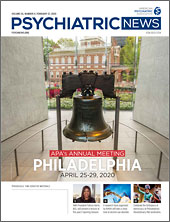Sessions for Residents, Fellows to Focus on Training Issues, Leadership, and Career Options
Below is a sampling of the many sessions that APA has planned for residents and fellows so they can meet and socialize with one another, ask questions, share information, and learn more about their chosen profession. The registration fee for the Annual Meeting includes admission (on a first-come, first-served basis) to all scientific sessions except courses. Check the APA Meetings App for the latest information.
SATURDAY, APRIL 25
8 a.m.-9:30 a.m.
A Roadmap to Psychiatric Residency: Assisting Stakeholders in the Medical Student Advising and Residency Recruitment Process
Impostor Syndrome and the IMG: A Cross-Sectional View Through the Psychiatric Career
Lights ... Camera ... Action! A Lesson on Educating Trainees to Address Social Determinants of Mental Health Through Interactive Theater
Workforce Diversity: Addressing the Leaky Pipeline for Black Men in the Psychiatric Workforce
10 a.m.-11:30 a.m.,
AJP Residents’ Journal: 15 Years of a Trainee-Led Journal
Patient Suicide Loss: Prevalence, Impact, and Practical Support Resources for Psychiatric Providers
Training the Next Generation of Psychiatrists: Models for Incorporating “Interventional Psychiatry” Into Residency Training
1 p.m.-2 p.m.
MindGames Resident Competition
1 p.m.-2:30 p.m.
Going Global: Navigating Mental Health Opportunities Abroad in Training and Beyond
Redefining the Old Boys’ Club: Inviting a Younger Generation Into Organized Psychiatry and Political Activism
The Benefits and Challenges of Assuming Leadership Roles: A Workshop for Residents, Fellows, and Early Career Psychiatrists
SUNDAY, APRIL 26
8 a.m.-9:30 a.m.
“But Everybody Is Doing It!”: Talking Psychotherapy Integration in Residency Training
Association of Academic Psychiatry Resident Curriculum Vitae Boot Camp
10 a.m.-11:30 a.m.
Should Psychotherapy Become a Subspecialty of Psychiatry? Opportunities, Pitfalls, and the U.K. Experience
Speaking Out: How Three Physicians With Lived Experience Are Fighting Stigma
The Importance of Public Psychiatry: Seizing a Sense of Urgency and Inspiring Future Generations to Serve Our Communities
1 p.m.-2:30 p.m.
John Gunderson Residency Workshop in Borderline Personality Disorder—Part 1
Teaching Residents to Supervise: An Experiential Workshop
1 p.m.-4 p.m.
A Leadership Boot Camp for Residents and Fellows
3 p.m.-4:30 p.m.
International Medical Graduates and Psychiatry Residency Training in the United States: Diverse Challenges and Opportunities
John Gunderson Residency Workshop in Borderline Personality Disorder—Part 2
Strengthening the Pipeline of Physician-Scientists During Psychiatry Residency and Beyond
MONDAY, APRIL 27
8 a.m.-9:30 a.m.
Assembling a Leadership Toolkit for Trainees: Perspectives and Experiences of APA Leadership Fellows
Patient Suicide in Residency Training: The Ripple Effect
1 p.m.-2:30 p.m.
Can I Make a Career—and a Living—Working With Homeless Mentally Ill Individuals? Part 1
Making Your Mark: Networking and Professional Development in Psychiatry
1 p.m.-2:30 p.m.
The Time Is Now: Advancing Quality Care by Increasing Workforce Diversity
3 p.m.-4:30 p.m.
Can I Make a Career—and a Living—Working With Homeless Mentally Ill Individuals? Part 2
The Bottomless Abyss: Updating Psychoanalysis in General Psychiatric Training Through the Lens of Child Psychoanalysis and Trauma-Informed Care
TUESDAY, APRIL 28
8 a.m.-9:30 a.m.
Mental Health Advocacy in the Trumpian Era
10 a.m.-11:30 a.m.
Psychodynamic Psychotherapy Supervision. How to Teach Psychodynamic Principles: Using Video Clips of Supervision for Open Dialogue
1 p.m.-2:30 p.m.
Avoiding the Chill Pill: Verbal De-escalation Training for Psychiatric Residents in a Simulated Lab Setting
Can I Just Text or Email You? Risk Management Considerations Using Text/Email in Psychiatry Practice
Conflict Management for Leaders in Psychiatry
The White Space: How Portraiture Affects Belonging and Well-Being in Academic Medical Spaces
Training the Next Generation of Physicians in the Treatment of Opioid Use Disorders: A Model for Waiver Training in Medical School
Working With the Homeless: From Residency to a Career
3 p.m.-4:30 p.m.
Empowering Trainees to Engage in Scholarly Work and Leadership Roles
Innovative Primary Care Training for Psychiatry Residents in Integrated Psychiatric Settings
International Web-Based Research by Early-Career Psychiatrists (ECPs): Examples, Opportunities, and Challenges
Journal Club Best Practices
Leadership Training for Trainees by Trainees
Physician Heal Thyself? Easier Said Than Done: Barriers to Physicians Getting Treatment and Strategies to Engage Them

